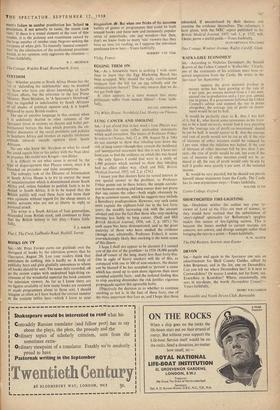SIR.—According to Nicholas Davenport, the Second Report of the Cohen
Council is `Kafka-like.' Clearly, one of the statements of his criticism must have re- ceived inspiration from the Castle. He writes in the Spectator for September 5:
. . . suppose the gross national product in money terms has been growing at the rate of 6 per cent. per annum derived from a 3 per cent. annual rise in production and a 3 per cent. annual rise in prices. If a government followed the Cohen Council's advice and stopped the rise in prices altogether, the average rate of profit on invest- ment would be cut by half.
It would be perfectly clear to K. that 3 was half of 6, but K., who learnt. some economics in his train- ing to be a land surveyor, would find it very puzzling that the 'average rate of profit on investment' should be cut by half. It would appear to K. that the average real rate of profit would not be cut at all. if the rate of increase of other incomes could be reduced by 3 per cent. when the inflation was halted. if the rate of increase of other incomes fell by less than 3 per cent., the rate of profit would be cut, but even if the rate of increase of other incomes could not be re- duced at all, the rate of profit would only be .cut by half if profits were ei(actly 6 per cent. of the national income.
K. would be very puzzled, but he should not puzzle himself about statements from the Castle. The Castle has its own mysterious ways.—Yours faithfully,


































 Previous page
Previous page